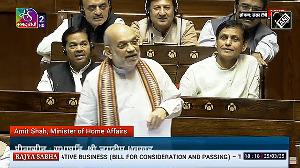Jairam Ramesh's tenure as Minister of Environment and Forests cannot be assessed in a hurry; there are lots of positives there, but also many question marks, says Himanshu Thakkar
"Kicked upstairs" is how many lobbyists gleefully describe Jairam Ramesh's removal from the Union Ministry of Environment and Forests in the cabinet reshuffle on July 12.
Their glee in fact reflects on the biggest failure of Ramesh era, namely that he could not bring systemic changes. Had he brought them, the lobbyists would not have been as happy as they are now.
But let us first look at his positive contributions first. And there are many. Ramesh has been reported to have listed these as some of the achievements of his tenure at MEF: Literal (glass doors at his office) and virtual (up-to-date website) transparency, public hearings on GM Brinjal (and others), speaking orders (e.g. on Posco, Vedanta, among others).
These are all correct claims, but each came with significant limitations. The MEF website is indeed a remarkable achievement of Ramesh. However, some of the crucial information that was statutory requirement (e.g. six monthly compliance reports of ongoing projects, which are still not available as per statutory requirements or agenda notes and minutes of meetings of Forest Advisory Committee) were missing on the website; some of it appeared only after RTI applications, some not even till date.
His orders did speak at times, but they did not always throw full light on the issues on hand (e.g. final order on Posco clearance). And then there were times when he refused to listen at all. Public hearings (for not project specific issues like GM crops or North East Dams) were good initiatives, but he did nothing to institutionalise them.
Ramesh was also very happy to institutionalise National Green Tribunal, but his failure to ensure that the NGT starts functioning before the National Environment Appellate Authority was wound up meant that there was a vacuum for over an year when neither of them were available. Jury is still out on how effective NGT will be, but its formulation has many serious problems.
Has he been transparent? Has he been accessible? Has he been responsive? Has he been clean, honest? Was he hard working, focussed, active, zealous? Indeed yes for each of these, a major plus point of Ramesh tenure was his accessibility and responsiveness.
Ramesh also got more than his share of brickbats, though. Small-minded commentators like Indian Express editor Shekhar Gupta has actually accused Ramesh of being publicity clamouring (headline hunting), but such commentators completely fail to understand the importance of environment issues. Gupta also said on TV channel on the night of reshuffle that Ramesh had brought emergency raj at MEF, which is again completely off the mark, as the following analysis shows.
To what extent was he constrained by the fact that he was not a cabinet minister and the Prime Minister was not with him on most issues? There are a number of occasions, when it seemed he had to tow the PM line (e.g. Posco, Lavasa, Jaitapur, Navi Mumbai airport, dereservation coal block from No-Go areas) and he may have taken a different view, left to himself. At many such points, he claimed he had to balance, but balancing is not an environment minister's mandate. His mandate is protection of environment as per legal norms and on many such occasions he did not do justice to his mandate.
Has he been consistent? One has to say no, many times he was not. While he cancelled clearances to Vedanta and Posco for lack of adherence to the Forest Rights Act, he refused to do the same in case of Polavaram dam in Andhra Pradesh.
Even on Posco, while three different committees from his own ministry gave evidence about violations, he ultimately succumbed to the pressure from the lobbyists and gave it ok when on ground there was no change in the situation from the point when he had cancelled the clearance.
He knew his YES BUT option has no meaning since the ministry has no capacity to ensure compliance, but he kept using that options (e.g. Posco, Navi Mumbai airport, Jaitapur).
On many occasions, even when repeatedly forewarned, he stubbornly refused to act till violations and environment conflicts on ground lead to deaths (e.g. thermal power projects in Srikakulam in Andhra Pradesh), but ultimately he acted.
Precious lives could have been saved had he acted earlier.
Similarly a lot of groups wrote to him that IIT Roorkee is not the right agency to do cumulative impact assessment of Ganga basin hydro projects due to the agency's pro hydro bias and that consortium is not the right agency for preparing the Ganga Basin Management Plan due to their lack of knowledge of ground realities or understanding of governance issues, but he remain stubborn on both occasions.
The pathetic outcome in the form of Ganga Cumulative Impact assessment is now available for all to see.
All the same, the number of battles he fought during his 25-month tenure makes an impressive list. He faced opposition from PMO (blind push for big hydro projects in North East), Power Minister Shinde, Coal Minister Jaiswal, Planning Commission vice chair Montek, Agriculture Minister Pawar (GM crops, Lavasa), Civil Aviation minister Patel (New airport for Mumbai), Orissa Chief Minister (Posco, Vedanta), Delhi Chief Minister (Renuka dam in Himachal for Delhi's water supply), Kerala Chief Minister (Athirapally), Maharashtra chief minister (Adarsh, Lavasa, Jaitapur, Mumbai airport among others), Uttarakhand Chief Minister (hydro projects on Bhagirathi among others), IPCC chief Pachauri (wrong predictions about glacier melting), lobbyist media groups like Indian Express (GM crops, hydro projects in North East), Madhya Pradesh Chief Minister (Maheshwar hydro, Ken Betwa link), among many others.
Moreover, Ramesh was also fighting battles within the MEF. So while he remained accessible and responsive, he could not ensure that his ministry officials were also accessible and responsive. On the issue of implementation of Forests Rights Act in particular and reforms in forestry sector in general, he was known to be battling with the forest bureaucracy.
He has been on a steep learning curve from the beginning. He learnt a lot, but the learning curve remained steep right till the end of this tenure. Climate change is an example here where he took over the complete negotiation on the climate change issue on behalf of the Government of India even at international level.
One of the important contributions of Ramesh on the climate change front was in formulation of India Climate Assessment Report and in pushing the case that India also needs to take responsibility for the climate change impact of its activities.
However, this need not have been done at the expense of weakening of the pillars of Kyoto protocol, which he ended up doing.
Even his fiercest critics acknowledge that Jairam Ramesh has brought the environment to the front pages, his track record will be difficult to emulate by his successors.
As one of his sternest detractors Shekhar Gupta of Indian Express said, Ramesh ended the ATM raj that prevailed at MEF when Raja and Balu were MEF ministers.
For me, Jairam Ramesh made one of the most important remarks at the discussion on approach to the 12th Five Year Plan when he said that the target of the plan should be how to improve governance and not target higher growth.
He invited undeserved criticism when he emphasised that the target of achieving 100 000 MW capacity addition in power sector for the 12th plan is not ecologically sustainable.
His welcome initiatives to protect Tiger zones like the Panna Tiger Reserve (against submergence due to Ken Betwa river link project), western ghats, wetlands, river zones and to improve our knowledge base on glaciers remains to be taken to logical conclusion.
However, the biggest limitation of the Ramesh tenure at MEF was that he could not bring systemic changes in the functioning of the ministry. He kept saying that Environment Impact Assessments are dishonest, cut-paste jobs, but did nothing effective to change that situation.
He did not penalise EIA consultant for fraudulent EIAs, when evidence was presented to him and when law empowered him to do so. He kept saying the public hearings are fixed, but did nothing to make them more genuine.
He knew that MEF does not have capacity to ensure compliance with the conditions of clearance that his ministry gives, but he did nothing to change that. Here again even when evidence was presented to him about non compliance (e.g. on Polavaram, Karcham Wangtoo, Nathpa Jakhri, Baspa, Phata Buyang, Shingoli Bhatwari, Srinagar), he failed to act appropriately.
Right in the beginning of his tenure he said that the MEF's rejection rates of projects is very low, but his tenure has not seen any higher rejection rates. We kept writing to him that his EIA notification excludes massive dams like Kalu and Shai in Maharashtra's ecologically fragile tribal areas from the requirements of EIA, Environment clearance and public hearing, but he refused to act.
He agreed on the floor of Parliament that Ganga and Yamuna Action Plans have failed to clean up the rivers, but the new initiative in the form of National Ganga River Basin Authority has absolutely no elements to take care of the reasons for failure of the Ganga and Yamuna Action Plans.
In conclusion, Ramesh's tenure in MEF cannot be assessed in a hurry. There are lots of positives there, but also many question marks. Yet, he has succeeded in bringing the environment issue deservedly, onto the front pages of media.
So much so that the biggest discussion point of this cabinet reshuffle is not elevation of Ramesh to cabinet rank, not his getting important portfolio of Rural Development, but his removal from the Environment ministry. One prominent English news channel devoted its entire half hour of 9 pm prime time slot to discuss just that!
Himanshu Thakkar is coordinator of the South Asia Network on Dams, Rivers & People. He can be reached at ht.sandrp@gmail.com






 © 2025
© 2025